Thoughts on Biden’s Approval

James Joyner’s post on Biden’s approval numbers sparked some thoughts that simply could not be contained in a comment box. So, here we go.
At a macro level, it always has to be remembered that the “presidential approval” number is really a general measure of overall satisfaction with the state of the country with partisanship figured in (which is to say that persons of the president’s own party are likely to approve simply by dint of their shared partisan identification).
In terms of this present moment, let’s consider this no-doubt incomplete list of variables:
- Baked-in polarization that sets the upper limit of approval at less than 60% (maybe less than 55% for any sustained period).
- Gas at the pump is visibly up (this is almost certainly the main way that most people internalize inflation). Other prices are also up.
- There are some clear and obivous shortages relative to normal. Cars are perhaps the best example. Even if one is not personally in the market for an automobile, one probably knows someone who it. The weirdness of the car market has been evident to anyone renting a car for quite some time now, I would add.
- Pandemic issues linger, although maybe the new CDC guidelines will help ease that (unless another letter of the Greek alphabet strikes). I would not that while we are kind of ignoring it, a lot of people are still dying from the disease on a daily basis.
- A huge number of Republicans have been convinced that the election of 2020 was stolen (and setting aside the veracity of that claim, one can ccertainly see how such views would impact Biden’s approval with those citizens regardless of anything else).
- A huge number of Democrats are fearful that American democracy is under seige, and fear that Biden isn’t doing enough.
- In case anyone hasn’t noticed, Congress is largely dsyfunctional (largely owing to design flaws) and so very little gets addressed by the legislature.
- The allegedly liberal, in-the-bag-for-the-Dems press keeps telling us what a failure Biden is. (I think this point can be over-emphasized, but I do think it matters, especially as it pertains to public opinion polls).
All of this sums to a not especially surprising number. I would note, however, that if the elections were held tomorrow, the D-R split for president would be far closer to 50-50 than the 40.8-53.2 disapproval/approval number currently shows, because registering discontent is far different than voting for the other party (or even abstaining from voting).
A side note: using words like “failure” a year into a presidency is harsh, and ahistorical (it is simply too early to use descriptors like “success” and “failure” at this stage).
Also: we, as a country, place far too much emphasis on presidents, which is an indictment of our constitutional order. We should not be so focused on the action of one individual. (But that is a larger problem).
All of this intersects with the broader question of overall satisfaction. If we turn to Gallup’s Satisfaction With the United States we see that Americans tend to be pretty damn dissatisfied as a general principle:
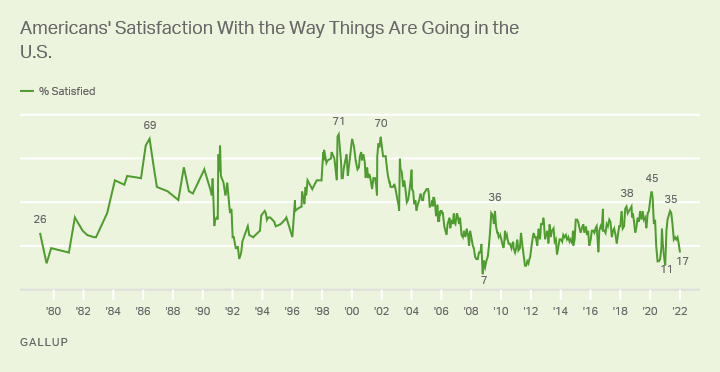
Because I am a curious nerd, I took the data provided in the linked piece that goes back to February 1979 regarding the question “In general, are you satisfied or dissatisfied with the way things are going in the United States at this time?” and checked average satisfaction. It was 34.17%. We are usually dissatisfied, at least when faced with a dichotomous choice.
In eyeballing the peaks, they tend to correspond with economic good times, certain foreign policy issues, and electoral shifts (my curiosity failed me when it came to doing a deep dive on the peaks, I must confess).
Of course, all this reminds me of a couple of things.
One is the first line of Tolstoy’s Anna Karenina, “Happy families are all alike; every unhappy family is unhappy in its own way.” Quite frankly, I am dissatisfied with the direction of the country, owing largely to our trajectory on the democracy issue, but the reason someone else is dissatisfied is likely linked to some other reason.
A second is another recent Gallup poll: Satisfaction With Own Life Five Times Higher Than With U.S. We consistently are pretty happy with our own lives, even as we are dissatisfied with the direction of the country (and this has been consistently true for a long time).
Personal satisfaction has been consistently and significantly higher than national satisfaction since 1979 when Gallup first tracked these two measures. But that divergence is near the record high as today’s 68-percentage-point gap between the two, from the Jan. 3-16 Mood of the Nation poll, is second only to last year’s 71-point gulf.
More generally, national satisfaction has exhibited far greater variation than personal satisfaction over the years. While personal satisfaction has ranged from 73% to 90% in Gallup’s periodic measures since 1979, national satisfaction, which Gallup now tracks monthly, has fluctuated between the record-high 71% in 1999 and the low of 10% recorded during the Great Recession in 2008.
The current 17% national satisfaction reading is the lowest of Joe Biden’s first year in office and coincides with his lowest job approval rating, 18% congressional job approval, sagging economic confidence and the expectation that inflation will rise in the coming months. Still, national satisfaction remains slightly above the 11% reading measured shortly after protesters violently stormed the U.S. Capitol on Jan. 6, 2020.
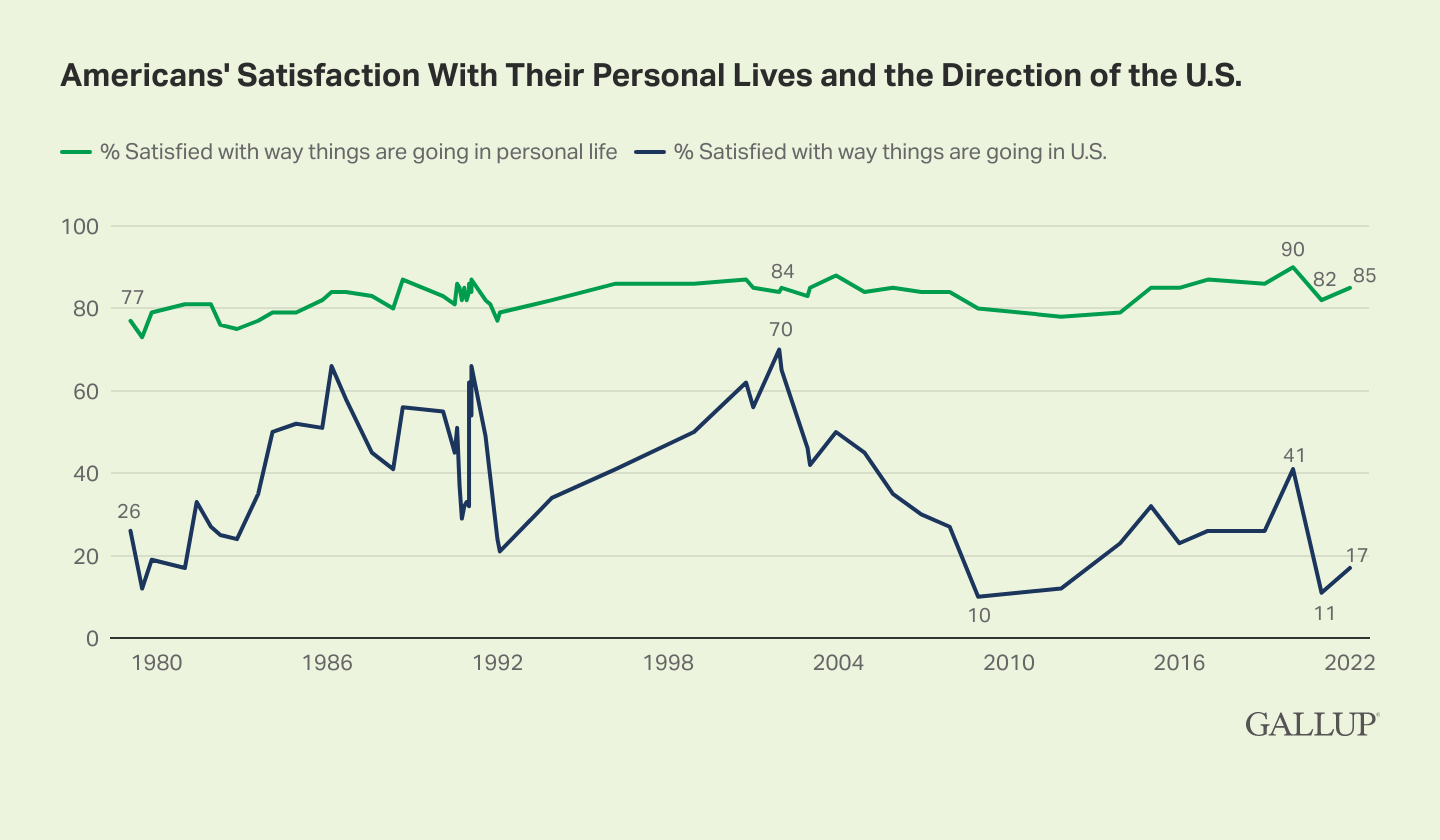
TL;DR version: public opinion is more complex than dichotomous measures (approve/disapprove, satisfied/dissatisfied) can tell us. They especially are not as predictive of electoral outcomes as horse-race coverage suggests.* I am not saying they aren’t important, but just less so than is made to be the case (e.g., a narrative of “failure”).
Moreover, I would argue that long-term dissatisfaction with the direction of the country (again going back at least four decades) is a key reflection of the failure of our institutions to adequately represent the interests of the population and the commensurate inability of Congress to govern as a result.
*I have a hunch that they used to mean more in the pre-party sorting times that started post-1994 when voters might be Democrats for state and local elections, Republicans national elections in large swaths of the country.


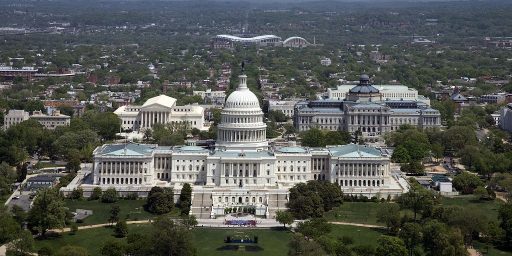
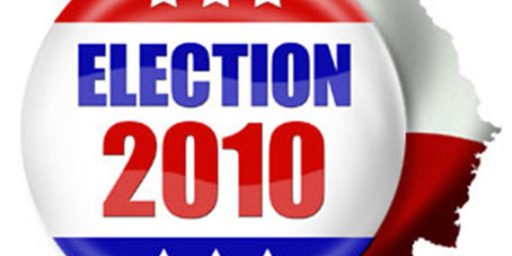

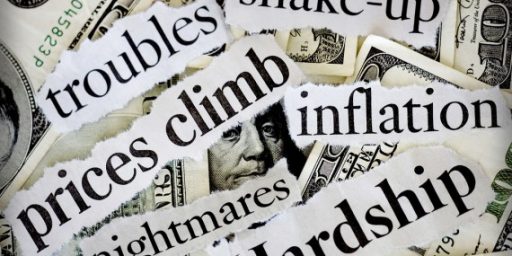
Presidents seem to function in loco parentis for many people. Why can’t Daddy buy me a pony, huh? Huh? Presidents are not parents, presidents are employees hired to perform a job.
For me the main job of a POTUS is foreign policy. The Fed handles inflation. Congress is meant to manage domestic legislation with input from POTUS. SCOTUS pretends to interpret the Constitution. But the unique function of the president, the function that no other official can manage, is foreign policy. And I consider Biden’s handling of Ukraine to be brilliant so far.
In other words, if the rest of the country agreed with me, this would be a great country.
So this means, given the difficulty and degree of consensus that is needed to make change under our system, we’re f#cked
These two ideas from your post pretty well sum up my position. I have summarized for friends as “We have something really good going here, but it’s hanging by a thread, and there is seemingly nothing I can do to improve the odds.”
@Michael Reynolds:
Agreed.
Also too, Biden’s foreign policy “blunder” in Afghanistan will ultimately be better understood as the painful end of a 20 year old mistake where Joe stepped up and took the hit for finally pulling off the bandaid.
Steven said:
I used the wisdom of Steven and other people who study this as empirically to wow some online friends, who were fretting about Obama’s approval in Fall 2011. I predicted that Obama would win by 5 points in Fall 2012. I was pretty much spot on. Everyone was impressed, but I was using the wisdom of folks like Steven then. Approve/disapprove means something, but it’s not necessarily a predictor of elections, especially not a year out.
That said, I see possibilities for the midterms, but I don’t know if Dems are actually planning something or being very reactive and defensive. Now is not the time for that, to my mind.
This assessment give far to little responsibility to the voters who continually vote party over country, in my view.
The main reason I’d love to see Biden reelected in 2024, is that it would drive one Cheeto Benito off his rocker* with wounded ego, especially if said Cheeto is the losing candidate again**.
*Well, more off his rocker.
**Yes, we know he’ll claim to have been cheated, again. But he’ll know the truth, and so will his mortally wounded ego.
@Michael Reynolds:
One of the recurring themes of this site, which I happen to agree with, is that Congress has largely abdicated this role. Oh, from time to time they make high-level decisions on fiscal issues — a trillion dollars to prop up the economy during a pandemic, another tax cut for business or the rich, allow the treasury to keep borrowing to pay the bills — but they don’t address policies. They have relegated that to the various agencies for the most part.
On Monday, the SCOTUS will hear oral arguments in West Virginia v. EPA and three consolidated cases. Many experts believe this is the case Roberts and Gorsuch have been waiting for to severely roll back the administrative agencies’ authority to regulate. I don’t think they’ll actually revive the antique delegation doctrine — holding that Congress can’t delegate legislative authority to agencies — but I do expect they’ll rule that Congress has to spell out in much greater detail what can be regulated. Combined with Congress’s refusal to act, it will usher in a real clusterf*ck, not the mild sort we’re currently suffering.
@Skookum:
While I would never remove the voters’ responsibility from the equation, we need to come to terms with the fact that government we get is not a reflection of what voters want.
A simple list of examples:
1. Two of the last six presidential elections has given the White House to the candidate with fewer votes.
2. The Senate substantially over-represents some voters.
3. As I noted recently, most House seats are not competitive.
The problem is the structure of the system that does not allow voters’ preferences to be fully represented (and sometimes not represented at all).
We constantly talk like we get the government we all collectively want, but that just isn’t true.
@Steven L. Taylor:
This is true, that our political system does not accurately reflect our votes. In a sane, democratic political system, the candidate and party with the most votes in 2016 would have won the White House and controlled the Senate. Eliminating a good chunk of our recent dramas.
But also, voter participation in the US is dismal. Mass nonvoting is a vote for the status quo.
Maybe more Americans are content with mediocrity and resigned to or happy with the way things are than partisans, the press, and political junkies would like to believe.
So… Garbage in, garbage out?
@DK:
See my list above and ask yourself why some people may think that voting isn’t worth the effort.
In many ways blaming the voters here is blaming the victim of the system (and I say that agreeing that more people should vote–but I am also trying the underscore that that is by no means the fundamental problem–not even close and until more of us understand that, we are going to continue to focus on the wrong solutions).
@Steven L. Taylor:
See also: Republicans, under the guise of protecting the system from imaginary fraud, claiming it shouldn’t be easy to vote. One might think they had ulterior motives – being most advantaged by the current broken system and all.
@Kathy: Everyone who wants to know the truth knows it and always has, FG included. Knowing the truth doesn’t seem to be stopping people who want to grift, destabilize the country, destroy confidence in the system (which would be okay if those destroyers wanted to create a better system, but…), sow the seeds of dissent and factionalism across a broader field, and… well, you get the picture. The pain that FG will feel in his psyche/soul from knowing the truth will not compensate for the damage he does by continuing the lie.
I believe in hell as a physical place. It doesn’t happen here to the bad guys no matter how much we wish for it. But keep on wishing for the perp walk, the mental anguish of knowing, and whatever else will make y’all feel better. Wishing for things in the abstract can be a source of mental health, I guess.